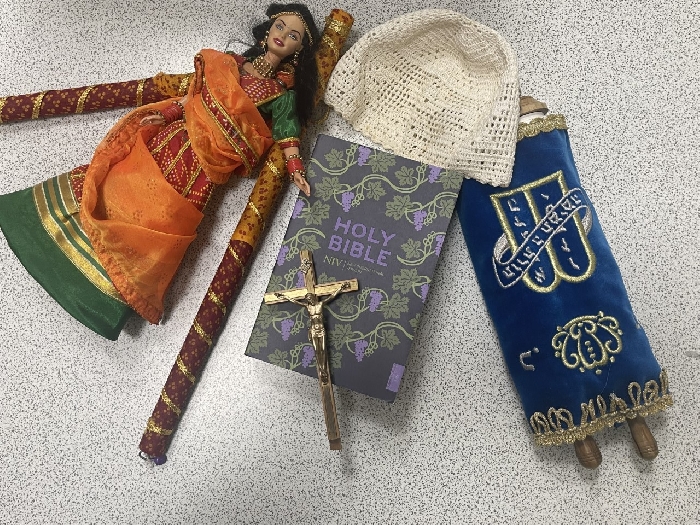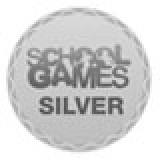Religious Education
Subject Leader: Miss Fenna
At Airedale Junior School our Religious Education (R.E.) Curriculum is taught in line with the Wakefield Agreed Syllabus 2018.
The curriculum for R.E. at Airedale Junior School aims to ensure that all pupils:
- Know about and understand a range of religions and views.
- Express ideas and insights about the nature, significance and impact of religions on the world
- Gain and deploy the skills needed to engage with religions and worldviews.
- Pupils are taught the knowledge, skills and understanding when learning about Christian, Muslim, Hindu and Jewish faiths. Children will also be exposed to other religions through themes and celebrations. Children will learn about religions through first-hand experiences with artefacts, stories, religious buildings and visitors.
- We have strong links with the local community church - Holy Cross and are regularly visited by our local Reverend, who deliveries assemblies and mindfulness sessions to our children.
The Airedale Religious Education Curriculum
Our curriculum is skills and knowledge based, including full coverage of the National Curriculum which meets the needs of all Airedale Infants and Junior pupils. This takes into consideration the school setting, local, national, and international developments.
Our pupils are offered a very wide range of experiences within the curriculum to extend their understanding of themselves and the world in which they live. The children develop skills, attitudes, and values to enable them to become lifelong learners and equip them for the future. The ability to learn is underpinned by the teaching of basic skills, concepts, and values. There should be no limits to curiosity, and we instil a thirst for new experiences and knowledge.
We actively promote British Values and Social, Moral, Spiritual and Cultural differences. We also provide opportunities for our pupils to learn about the contribution of Britons to innovation, excellence, and changes in the world.
The Curriculum has been organised into topics which are a vehicle to promote our school values and curriculum drivers and allow for the development of skills and understanding within and across the subjects. Our curriculum topics allow the teaching of threshold concepts that are the fundamental ‘learning elements’. These concepts are built upon and developed within the year, across the year and over the course of the school experience.
Adaptive teaching (aka agile teaching) recognises individual needs; the need for varied and additional resources; when, where and how additional support can be facilitated; and how children learn best. Teachers must plan lessons so that all pupils can study every national curriculum subject and experience success against age-appropriate expectations and/or their own bespoke personal targets.

Our TRUST values of Ambition, Bravery and Respect underpin our school ethos. We encourage our children to develop tolerance and respect of others’ views whilst being secure in the knowledge that their own views, opinions, and feelings will be valued. Our children are taught to develop their knowledge and understanding of religions and worldviews, recognising their local, national, and global contexts. Our children are taught to raise questions and be brave enough to express their own views and questions in response to the religions and cultures that they are learning about. Our curriculum celebrates the success of people from a wide variety of cultures and religions, showing children that these are not barriers to success and aspiration.
Oracy and communication are fundamental skills that we believe equip our children to be life-long learners. Our R.E curriculum supports this aim by children being able to respectfully discuss their views and differences with one another. Our pupils understanding that their voice is a vital tool used to discuss and celebrate their diverse backgrounds, enables our pupils to have meaningful conversations, fostering an environment of mutual respect.
The vocabulary taught in RE is carefully chosen and progressive across units of work, which we expect children to know, understand and apply in context.
Being independent and fostering a love for learning is crucial in our school. Our children need to develop enquiring minds and be investigate about the diverse world in which we live in.
How do we ensure progression of knowledge and skills?
At Airedale Junior School, we have in place, for each subject area, a knowledge and skills progression document, which is used for planning, to ensure sequenced and appropriate content for specific year groups. Teachers are clear on the learning and expectations for each year group, as this has been carefully selected and mapped out so that children are building on prior knowledge and skills each term and each year. Whenever possible, we teach through a themed approach, to enable our children to embed and revisit learning, make connections and develop a greater depth of understanding within the subject. The content is chosen in order to make effective links with key cross-curricular themes, reflect expectations in the National Curriculum programmes of study and engage and inspire children’s curiosity and interest in RE.
Ultimately, our curriculum is designed to ensure that pupils know more and remember more, through the use of progressive skills. Within these documents there are opportunities for differentiation, in order to meet the needs of all learners.
How is the subject taught?
When children are in RE lessons, they are explicitly told that they are going to be exploring and celebrating the diverse world in which they live in. They are then reminded of the key skills that they will learn, use and develop within this subject, specifically linking to their prior learning. The knowledge content is carefully selected and skilfully taught alongside the key skills and concepts, which are threaded throughout the curriculum. This allows children ample opportunities to revisit, reinforce and embed learning.
Within each RE lesson, children are introduced to and reminded of key vocabulary, in order to promote oracy and language acquisition. Specific questioning is used to check children’s understanding and prior knowledge, before new concepts, skills or knowledge are introduced. Modelling is used by class teachers to clarify expectations, children are then given plentiful opportunities to consolidate, build upon and apply basic skills and knowledge, across a series of lessons, as well as across the year. Through studying a range of people from the past and present, who have had an impact on different religions, as well as a range of and cultures, children are able to increase their cultural capital.
Look what we have been up to in our lessons!
How do we know that our children are making progress?
Ongoing assessments of the children’s knowledge and skills are made by the class teacher. Misconceptions are addressed and next steps carefully planned. Children’s outcomes are compared to the subject specific skills and knowledge documents.
Subject leaders gather an overview of children’s outcomes in each subject area. This is used to plan appropriate next steps for their future learning, as well as provide an overview of learning within a subject area cross the whole school.
What wider opportunities are provided for our children?
In addition to discrete teaching in this subject, opportunities for RE through additional enrichment and links with other subject areas, ensure that elements of the RE curriculum are accessed by children throughout the year. Our children visit differing places of worship throughout their time at Airedale Junior School. We also have visitors from other faiths come in to work alongside the children, educating them about diverse cultures.
RE: Further Information & Links








